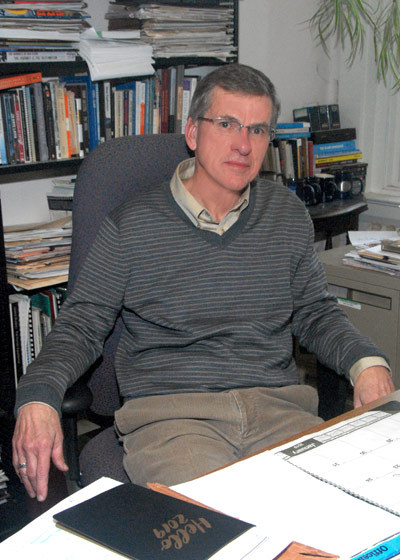Saying Goodbye to an Icon
School of Arts & Sciences Professor Pat Anderson arrived at Colby-Sawyer in September of 1977. He immediately fell in love with the college and enjoyed raising his children in New Hampshire. When an opportunity presented itself to teach at his alma mater – the University of Notre Dame – Anderson knew he wanted to take advantage of this rare opportunity. He took a leave of absence from Colby-Sawyer and took on the role of visiting professor at Notre Dame. After a year, he was subsequently offered a full-time position at Notre Dame.
“It was a difficult decision to make, but I decided to stay here because we loved raising our young children in New Hampshire and because Colby-Sawyer's focus on undergraduate teaching best fit my own talents and passions,” said Anderson, of his decision to turn down the fulltime position. “Because of our small size, I have been able to create and teach numerous courses which have reflected my own interest and expertise, thus adding to our curriculum in some substantive ways.”
Anderson created and taught many courses during his 43-year tenure at the college and, when asked what his favorite one is, he replied that is comparable to asking someone which of their children they like best. He admitted that an honorable mention might go to his Literature of the American Renaissance course, which included a trip to Concord, Mass., to visit the sites where Ralph Waldo Emerson, Henry David Thoreau, Nathaniel Hawthorne and Louisa May Alcott all lived, or to Movie Mavericks, in which he introduced students to independent directors and films which fell outside the Hollywood mainstream, or On the Road, an honors course in which they explored journeys both within and outside the U.S. through history, novels, film and art.
“But if I had to choose one, it would be Native American Literature, which was inspired by my ongoing research into indigenous cultures and which draws on my own experiential learning at native places ranging from the desert southwest to the Pacific northwest, from Central and South America to New Zealand,” Anderson said.
During his career at CSC, Anderson has also seen a lot of change. One of the most significant was when the college transformed from an all-women’s school to a coeducational institution. He remembers there were a lot of conversations about why this change was important.
“The process was inclusive, and I admire Peggy Stock and the administration for saving the college at that time,” Anderson said. “It was a good change. We could offer more real-world experiences by having men and women together. It allowed a diversity of perspective.” Through the 43 years that Anderson taught at the college, he said his proudest accomplishment was the way he was able to impact the lives of the students, both inside and outside the classroom, and to watch them mature as students.
“I've had the pleasure of teaching many of my students multiple times, so I've witnessed their growth intellectually as they gained knowledge and confidence during their Colby-Sawyer experience,” Anderson said. “I've also worked with a number of our students outside the classroom in a film review program called ‘Reel Talk,’ which first aired on our radio station and then on local cable TV. While we haven't produced the program for a number of years now, during the decade or so when it ran, I got to know students, who were fellow reviewers as well as the technicians, directors and camera people, in ways that made them my colleagues and friends rather than just my students. Many of these students are the ones I still keep in regular contact with.”
Anderson has earned numerous awards during his tenure at CSC. He earned the Jack Jensen Award for Excellence in Teaching in 1998, and was selected as a George Washington Distinguished Professor/Scholar by the New Hampshire Society of the Cincinnati. He was also awarded the Gibney Distinguished Professorship in 2007 and the Gown Award in 2016. Most recently, at the 2020 Commencement ceremony, Anderson was bestowed the highest honor at Colby-Sawyer College – the Susan Colgate Cleveland Medal for Distinguished Service.
“I am very honored and humbled by this unexpected award and the recognition it brings, though equally rewarding is the knowledge that I've made an impact on the lives of generations of Colby-Sawyer students, many of whom still keep in touch,” Anderson said.
As he leaves Colby-Sawyer, Anderson hopes to travel with his wife Betsy as soon as it is safe to do so again. His destination list includes an African safari, a cruise to the Chilean fjords on the southern tip of South America, and a driving trip through Portugal and Croatia, while visits to see their children and grandchildren in Toronto, Nashville, Tenn., and Alexandria, Va., will also become more frequent. He also has some writing projects in mind, which include putting together a collection of his travel essays and working with research materials (both audio and video interviews) he collected when he spent time with the Nez Perce tribe in Idaho.
Anderson says he will miss the colleagues he has worked with and the students he has taught. He will miss the classrooms where ideas came alive and students getting excited about works of literature and film. He will miss the satisfaction of having made a difference in people's lives, and the opportunities teaching continually provided him to do new research, examine difficult texts and create a community of learners which was unique in every class he taught.
